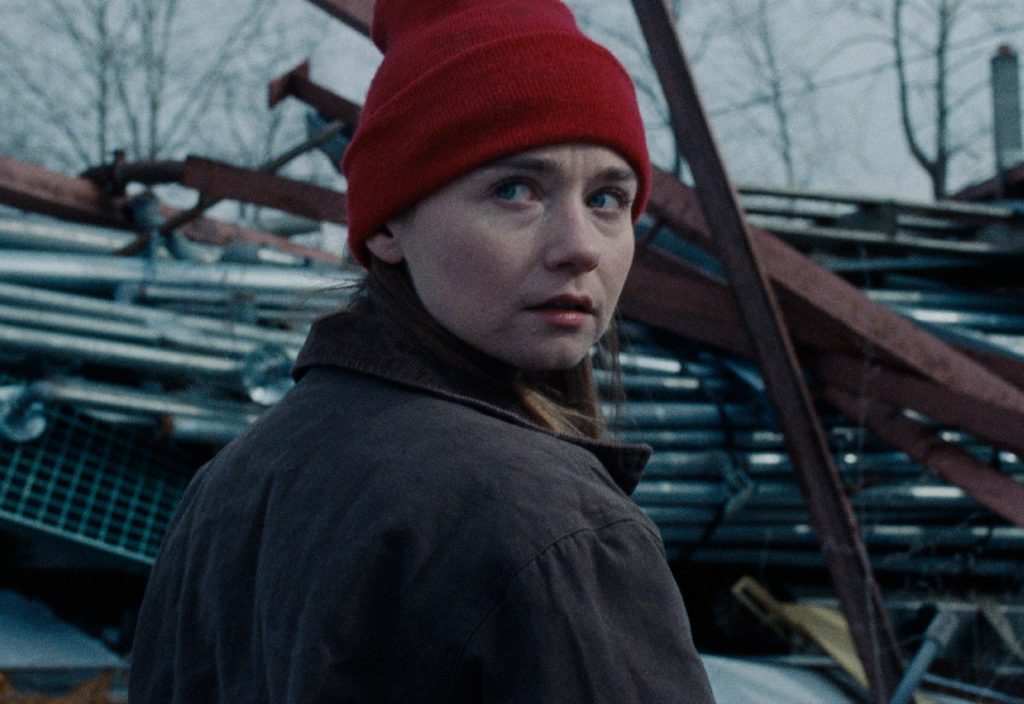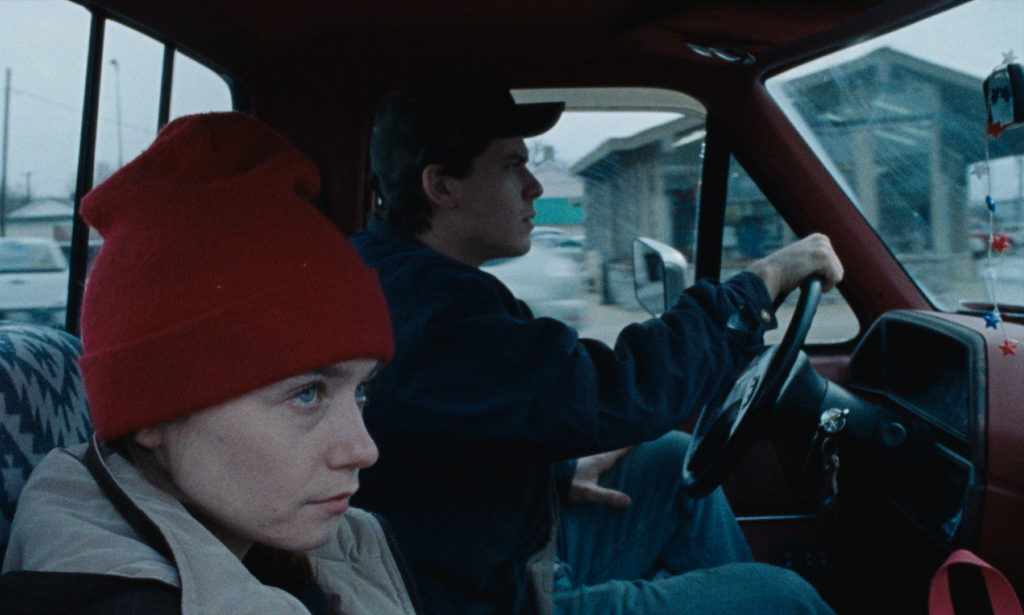July 9, 2021
by Carla Hay

Directed by Nicole Riegel
Culture Representation: Taking place in an unnamed city in southern Ohio, the dramatic film “Holler” has a predominantly white cast of characters (with a few African Americans) representing the working-class.
Culture Clash: A teenager from a dysfunctional family with financial problems must decide what she wants to do after she graduates from high school, and she gets involved in illegal scrap metal sales.
Culture Audience: “Holler” will appeal primarily to people who are interested in realistic and sometimes gritty stories about American working-class life.

“Holler” doesn’t break new ground for coming-of-age movies about a teenager who’s unsure of what to do after high school. However, the performances in the movie are well-acted and notable in their depiction of working-class life in southern Ohio. Jessica Barden carries “Holler” with the right mix of toughness and vulnerability. Written and directed by Nicole Riegel, and based on her short film of the same name, “Holler” was already an authentic-looking film, but Barden’s performance makes it a more compelling movie to watch.
Barden is such a talented actress that people who see “Holler” might be surprised to find out that she’s British in real life. She tends to portray Americans in her on-screen roles. (Barden also played a tough-but-tender working-class character in the 2020 dramatic film “Jungleland.”) In “Holler,” Barden’s character is Ruth Avery, a teenage loner, who’s in her last year of high school and facing major crossroads in her life.
Ruth and her older brother Blaze (played by Gus Halper), who is in his early 20s and is Ruth’s legal guardian, live in a house in an unnamed southern Ohio city with a depressed and shrinking manufacturing economy and where things have become quite unstable for Ruth and Blaze. They’re financially broke, and they have been served several eviction notices. Ruth is having problems keeping up with her school assignments, and she’s been punished for too missing too many classes.
Where are their parents? Ruth and Blaze’s mother Rhonda (played by Pamela Adlon) is an opioid addict who’s currently in jail and awaiting a court hearing on drug-related charges. Ruth and Blaze’s father is not seen or mentioned. It’s implied that he was not involved in raising Blaze and Ruth. Blaze, who dropped out of high school to take care of Ruth, works at the same factory where his mother worked before she was fired due to being under the influence of drugs while on the job.
To make extra money, Blaze and Ruth sell abandoned items at a local junkyard that is owned and operated by a scruffy and shady character namd Hark (played by Austin Amelio), who is in his 30s. In the movie’s opening scene, Blaze and Ruth are making a sale to Hark, but he drives a hard bargain and lowballs them on the purchase price. Because they need the money, they take Hark’s offer, although Ruth angrily tells Hark that she knows he’s ripping them off. Because of Ruth’s feisty spirit, it won’t be the last time that she and Hark will be at odds with each other.
Even though she’s having problems in school, Ruth is very intelligent, interested in learning, and a capable of getting good grades. In an early scene in the movie, she goes to the school library to steal a book because she’s been banned from borrowing books from the library due to her high absentee rate. Ruth immediately gets busted for the theft by a teacher named Mr. Porter (played by Joe Hemsley), who tells Ruth that if she doesn’t stop behaving badly, she could be expelled from school. Ruth acts like she doesn’t care, but viewers can see that deep down, she does care.
Meanwhile, Blaze frequently tells Ruth that she’s smart enough to go to college. He encourages her to pursue a college education because he thinks that Ruth is the person in their family who’s most likely to be able to accomplish things beyond their working-class upbringing. There are hints that Ruth thinks so too. In one scene, Ruth privately listens to a podcast where a celebrated female engineer (who’s unidentified in the movie) talks about how she got to where she is in her male-dominated field.
Although the movie never says what Ruth’s best academic subjects are and what she would want to study in college, she shows an aptitude for math and engineering when she and Blaze end up getting involved in Hark’s side business of illegally selling stolen scrap metal. Ruth and Blaze’s decision to get involved in this criminal activity comes after certain things happen that make Ruth and Blaze even more financially desperate than when the story began. Blaze and Ruth soon find out that the illegal scrap-metal hustle is a lot more dangerous than they thought it would be.
“Holler” has very few scenes of Ruth in high school, because her world ends up revolving around Hark’s junkyard and the illegal activities of stealing metal from abandoned buildings at night. There are a few tension-filled scenes of Ruth and Blaze visiting their mother Rhonda in jail. (Fun fact: Barden guest-starred on Adlon’s comedy series “Better Things” in 2020.) Ruth has a lot of resentment toward her mother, who tells Ruth, “We’re not college people,” when she finds out that Ruth has applied to go to college. Blaze usually tries to keep the peace when Ruth and Rhonda get into verbal arguments with each other, but he’s feeling the pressure of being the only parental figure in Ruth’s life.
The movie features a few supporting characters who are part of Ruth and Blaze’s lives. Linda (played by Becky Ann Baker) is a no-nonsense, respected senior employee at the factory. She also happens to be Rhonda’s best friend. When Ruth feels like she has no one else to turn to, Linda is sometimes a source of comfort.
By contrast, Ruth can barely tolerate Blaze’s girlfriend Tonya (played by Grace Kaiser), who also works at the factory. Ruth isn’t afraid to express that she thinks Tonya is too promiscuous and not good enough to be with Blaze. The relationship that Blaze and Tonya have isn’t really true love, but they have genuine affection for each other. In other words, Tonya isn’t Blaze’s Ms. Right. She’s Blaze’s Ms. Right Now.
One of the best things about “Holler” is how realistically it shows the complications of being a teenager who’s on the cusp of legal adulthood in contemporary America—being old enough to drive and work, but not old enough to drink alcohol. Being in your late teens is usually the age range when people feel the most pressure to figure out what they want to do with their lives. However, those choices can often restricted if they require a college degree that someone might not be old enough to have, might not be able to afford, or might have other responsibilities that prevent someone from getting a college education.
Ruth embodies this dichotomy of being an immature child and being a mature adult in her personality. She can be a tough-talking brat but also a good listener. She can sometimes act like a know-it-all, but she’s also a patient observer who’s willing to learn. She wants to grow up quickly and be independent, but she also likes the comfort of knowing that she can have someone to lean and and back her up when she needs it.
Ruth’s relationship with Blaze has a very genuine younger sister/older dynamic with real family love between them. The only thing that Ruth and Blaze argue about the most in the movie is whether or not she should go to college. Blaze is more enthusiastic about it than Ruth is. Look for big clues on how Ruth uses her red ski cap as a conscious or subconscious symbol of the life that Blaze thinks that Ruth should leave behind.
The interactions between Ruth and Hark are what really demonstrate Ruth’s feelings of confusion over wanting to be a child and wanting to be an adult. Ruth and Hark, despite their differences, end up being attracted to each other on an emotional level. He admires her assertiveness and quick thinking, while she admires his confidence and leadership abilities.
There’s a scene where Ruth, Hark, Blaze, Tonya and some of their co-workers are all hanging out at a roller skating rink, where Ruth shows some aloofness yet vulnerability. Hark asks Ruth to go on the skating rink with him, even though they both know they aren’t very good at roller skating. It’s the first sign that something more than a platonic relationship might happen between Ruth and Hark.
Later in the movie, Ruth gets an injury on her right leg, and Hark makes a move on her when he’s helping her with the bandages. As creepy as it might be for a man to make sexual advances on a teenager who’s half his age or young enough to be his daughter, it’s a reality that happens a lot. Ruth is an easy target of older sexual predators because she comes from a dysfunctional family with little or no parental supervision. And it would be easy to speculate that teenagers with “daddy issues” would be more vulnerable to seeking approval and attention from much-older men.
Blaze is very aware that Ruth being around Hark and Hark’s all-male crew of employees will have some risks, so Blaze warns them not to hurt or take advantage of his Ruth. Blaze is a protective brother who keeps a watchful eye on Ruth when they’re with each other. But will it be enough to keep her out of danger?
“Holler” has some twists and turns in the story that are not very predictable. The movie doesn’t make anyone an evil villain but instead presents a clear-sighted view of what happens when people make bad choices. Halper and Adlon give admirable performances, since they are entirely believable as Ruth’s family members who want the best for her but express it in different ways.
As good as the acting is by all of the cast members in “Holler,” this movie is really Ruth’s story, and Barden delivers a nuanced and meaningful performance. Riegel’s even-keeled direction is minimalist and observational, which fits the tone perfectly for a movie about people who don’t have a lot of material possessions, but their lives are complicated enough that they don’t have time for fussy judgment. “Holler” is an impressive feature-film debut for Riegel, who achieves the right balance of telling universal and relatable truths with a very specific story.
IFC Films released “Holler” in select U.S. cinemas, on digital and VOD on June 11, 2021.


